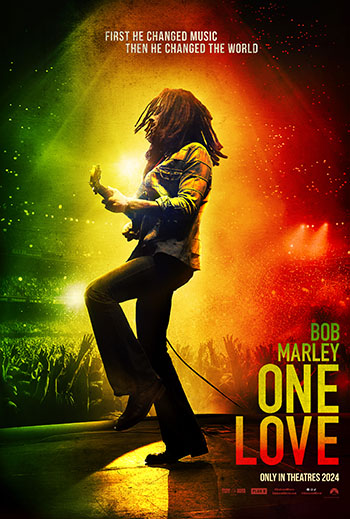Movies

New Releases • A-D • E-H • I-P • Q-Z • Articles • Festivals • Interviews • Dark Knight • Indiana Jones • John Wick • MCU
Go behind the scenes of Bob Marley: One Love
Featurette: Paramount Pictures
Bob Marley: One Love
Directed by Reinaldo Marcus Green
Rated PG-13
Sung 14 February 2024
#BobMarleyMovie • #OneLoveMovie
What should’ve been a cinematic anthem of Bob Marley’s vision of love and freedom falters on the dramatic beats.
Trench Town

There’s a moment in Bob Marley: One Love that encapsulates everything this movie should’ve represented. Bob (marvelously portrayed by Kingsley Ben-Adir) has risen to stratospheric heights of success with a sold-out tour of Europe; the shows grow from clubs to arenas to stadiums. Amid the action are era-setting details too easily lost: Mick and Bianca Jagger. Joe Strummer. But Bob’s steering clear of his home country of Jamaica. Still dealing with the trauma of his homeland on the brink of civil war and a shooting incident that heightened his status as a political target, he’s told there comes a time when the messenger needs to become the message.
If only the movie had focused on that one thought and used it as the focal point around which everything else centered, it could’ve been a great love letter to a music legend.
Instead, the narrative repeatedly loses its way as it indulges in the unnecessary distractions of infidelity — between husband and wife and between band and manager — that are almost obligatory in music-related biographies. Sure, those things happened in some fashion. But in a relatively short movie (it’s only 107 minutes), it takes too much time away from the message and the music.
The cast is great, particularly Lashana Lynch as Rita Marley. The director, Reinaldo Marcus Green (King Richard), is certainly competent, and he’s given co-screenwriter credit. But, collectively with three other writers (Terence Winter, Frank E. Flowers and Zach Baylin), the words don’t capture the man or the history very well. While the involvement of the Marley family (including Rita and Ziggy as producers) no doubt is intended to give the movie legitimacy, it also hints at a desire to gloss over the warts.
Which leaves those warts of infidelity there for unnecessary acknowledgement, not effective drama.
Reggae Revolution
The best bio-pics find a hook, a style that captures the essence of the subject. A prime example is Rocketman, the superlative Elton John movie. In a totally different vein, Oppenheimer leveraged color and black & white to make a distinction between Oppenheimer as the catalyst and Oppenheimer as the reactor.
So much more could’ve been done to make Bob Marley’s story flow with the beat of a Reggae song. There is a refrain of Bob during his childhood, a dreamscape in which he’s surrounded by fire and rescued by a soldier on a horse. Having been given a photo of his (white) father on a horse, it’s a way of Bob coming to terms with his past.
But even that’s the wrong focus.
More could’ve been made of that difficult childhood up front. The adversity is referenced in an opening title card, but the action begins with Bob already Jamaica’s most famous star.
It’s certainly not necessary to tell a cradle-to-grave narrative, but it is necessary to identify the right elements of Bob’s life to feature. Again, it raises the question of how the screenwriters got involved and how involved the Marley family became in the production.
It’s a story that wreaks of too many cooks in the kitchen — or too many hands on the keyboard.
Stand Up for Your Rights
Bob Marley: One Love is most effective when it sticks to the man and his music, and his ambitions. There are compelling contrasts hidden in the dialogue. Rita talks of wanting a man of ambition who lives a life of meaning; it’s a nice contrast to Bob’s laid back style, battered by the chaos lurking behind the man and his music. How can Bob bring peace to a country when he doesn’t have it in his own home? This is a man who proclaims his guitar is his machine gun; if only more had made of that sentiment in One Love.
Some of Bob’s most famous songs get the spotlight. There’s the inspiration for Exodus — Ernest Gold’s score for the movie version of Leon Uris’ Exodus, which tells the story of the founding of the State of Israel. There are also hints at how No Woman, No Cry came to be.
But there’s also a really awkward handling of what ultimately brings Bob’s life to an end. It’s not the bullet of a political activist. It’s cancer that claims Bob’s life at the all too young age of 36. An appointment with a doctor reveals maybe the skin cancer is genetic, given his Caucasian father. It’s an issue Bob fails to address. Skin cancer first appears on a big toe, but Bob doesn’t take action. As scenes unfold with Bob enjoying his time playing on the soccer pitch, the insinuation is he’d rather play the beautiful game as long as he can rather than extend his life by amputating a toe.
And then, finally, when Bob returns to Jamaica as a world hero, the movie’s narrative ends with Bob performing at his bold concert for peace. Then it shifts to vintage news footage of the real kicker: Bob brought two of the country’s opposing political leaders on stage for a handshake.
That’s the story. Bob Marley: singer, writer, father, husband, activist, all from the humblest of beginnings.
But that’s not the story that gets told. Instead, the messenger’s message gets lost in dramatic tropes.
• Originally published at MovieHabit.com.


